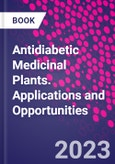Antidiabetic Medicinal Plants: Applications and Opportunities presents new developments that are impacting the use of plants to address diabetic conditions. Presenting multiple perspectives on these plants, their identification, cultivation and application, this book presents the state-of-the-art with an eye toward the future. Presented in five parts, the book first provides an overview of plants with antidiabetic properties, then moves to the agricultural practices for the cultivation and production of those plants. Part Three focuses on the chemical composition and phytochemicals of the plants before then moving into a study of the physiological, biotechnological, and molecular approaches to optimizing these plants.
The book concludes with insights into current and potential future medical and clinical applications, making it ideal for those seeking to understand the biology and chemistry of plants with anti-diabetic properties and their effective development and application.
Please Note: This is an On Demand product, delivery may take up to 11 working days after payment has been received.
Table of Contents
Part I Overview of Medicinal Plants with Antidiabetic Properties
1. A comprehensive review of medicinal plants effective in diabetes management
current status and future prospects
2. An overview of some Indian vegetables, fruits and spices effective in diabetes and metabolic disorders: Current status & future scenarios
3. Antidiabetic properties and applications of traditional medicinal plants of Asia
4. Medicinal use of Bauhinia forficate as an anti-glycemic agent: A systematic Review
5. Antidiabetic plants of Purulia district of West Bengal, India
6. Middle Eastern medicinal plants in the management of diabetes and its complications
7. Antidiabetic plants from North Africa and the Middle East
Part II Agricultural Practices for the Cultivation and Production
8. Employing cost-effective and eco-friendly technologies for the sustainable agriculture of antidiabetic plants
9. Enhancing nutritional and antidiabetic properties of Stevia rebaudiana Bert. - A sweet-leaf plant through different scientific approaches
10. Cultivation practices of fenugreek: A potential medicinal crop
11. Utilizing scientific approaches for the cultivation of the most common Indian antidiabetic plants
12. Role of PGRs in enhancing antidiabetic bioactive compounds of Ocimum sanctum
Part III Chemical Composition and Phytochemicals
13. Phytochemicals as therapeutic interventions in diabetes
14. Plant origin Unani drugs used in the management of diabetes mellitus & their identification and characterization
15. Bioactive principles with ability to ameliorate insulin resistance: current status and future perspective
16. Antidiabetic properties, bioactive constituents, mechanism, and other therapeutic effects of Glycyrrhiza glabra
17. Nutritional properties and mode of action of phytochemicals of fenugreek
18. Evaluation of anti-diabetic and antihypertensive activity and phytochemicals in leaves extract of some Indian medicinal plants
19. Medicinal plants and their bioactive components with antidiabetic potentials
Part IV Physiological, Biotechnological and Molecular Approaches
20. In silico molecular docking and in (vivo/vitro) studies of bioactive compound of Indian Medicinal Plant: A metadata review
21. Type 2 diabetes mellitus: novel targets and multi-target directed phytotherapy
22. Glucose uptake: a promising target of medicinal plants
23. Egyptian plants stand a shield against diabetic mellitus: Scientific evidences and mechanistic approaches
24. Molecular analysis of selected medicinal plants
25. Physiological and molecular characterization of fenugreek for antidiabetic properties
Part V Medical and Clinical Application
26. Pharmacological profile of medicinal plants used to control diabetes
27. Antidiabetic plants with insulin mimetic activity
28. Attenuation of Hyperglycemia in Streptozotocin Induced Diabetic Mice (Mus musculus) by Aqueous Extract of Ophioglossum gramineum
29. Vernonia amygdalina (Bitter Leaf): sweet health benefits against diabetes and its complications
30. Ocimum sanctum: Antioxidative efficacy in Type 2 diabetes and its comorbid complications
31. Plants as wound healing agents in diabetic wounds








